
Post-16: Years 12-13 Course Guide 2025-2026


Post-16: Years 12-13 Course Guide 2025-2026
At Post-16 (Years 12 and 13) we offer a two-year programme for students in the Secondary School that is designed to support the varied individual needs of our learners. BSB is the only international school in Belgium which offers three pre-university programmes:
• Advanced Levels (A Levels)
• International Business and Technology Education Council Qualification (BTEC Level 3)
• International Baccalaureate Diploma (IB).
These include:
• More than 25 IB subjects
• More than 20 A Level subjects
• 3 BTEC subjects
We have high academic standards. Typically, around a third of our students gain the highest A*/A grades at A Level which is significantly above national levels. The pass rate and points average in the IB Diploma are typically much higher than the worldwide average and among the very best results in the world. BTEC students consistently achieve a 100% pass rate with the majority being awarded a Distinction/Distinction*.
There is an extensive range of enrichment activities available for our students and opportunities are provided for the development of their leadership skills.
Years 7-9 11-14 A broad curriculum
Years 10-11 14-16
Exam years
• (International) General Certificate of Secondary Education
• BTEC Level 2 in Business also available as an option
Years 12-13 16-18
Pre-university exam years
• A Level
• IB
• BTEC
• Students are regularly assessed in class
• School reports are issued four times in Year 12 and three times in Year 13
Solid foundation in a wide range of subjects
• Two-year programme
• Exams at the end of Year 11
• 6 core subjects and 4 option choices
• BTEC is vocational and is continually assessed
Two-year programmes
• A Level and IB have final exams
• 3 subjects for A Level
• 6 subjects for IB
• Direct entry criteria apply
• Parents are invited to sessions to discuss their child’s progress around the time of each report
• BTEC is continually assessed
• IB and A Level courses have internal exams at the end of Year 12 and students must be on track to meet the passing criteria of the IB Diploma or at least E grades in each A Level to progress into Year 13
• In Year 13 internal exams take place in the 2nd half of the Autumn term with final external exams taking place between April and June of Year 13
Updated September 2024
From these three programmes, we offer four Post-16 Pathways which provide an avenue for all BSB students to not only find academic success, but also feel equipped with the skills and approaches to learning needed to thrive in their chosen life beyond Secondary School. Each Post-16 Pathway leads to the awarding of a particular qualification or diploma, recognised by higher education institutions around the world. The awarded qualification, as well as the student’s individually achieved results, will determine the scope of higher education institutions for which the student may be eligible to apply for admission. Consideration about which countries and/or institutions accept a particular qualification is essential before final decisions about pathways are made.
Research into any specifically desired university admissions requirements is essential by students and parents throughout this process. Support for this research is embedded into the Post-16 Pathway Options process from members of the Higher Education and BSB Futures team.
Our Post-16 Pathways are equally valued at BSB and allow for a choice of pathway best suited to supporting a student’s individual growth and development towards future goals. Students are encouraged to pursue the most appropriately challenging pathway for their desired plans after BSB, and in which they can be successful.
Prior to choosing their Post-16 Pathway, students and parents must consider many factors, including the student’s:
• Academic performance and results, particularly within Years 10-11, including GCSE results
• Individual learning needs
• Unique passions and interests
• Future goals and aspirations
• Preferences and/or limitations on higher education and/or career opportunities, including geographic and/or financial boundaries
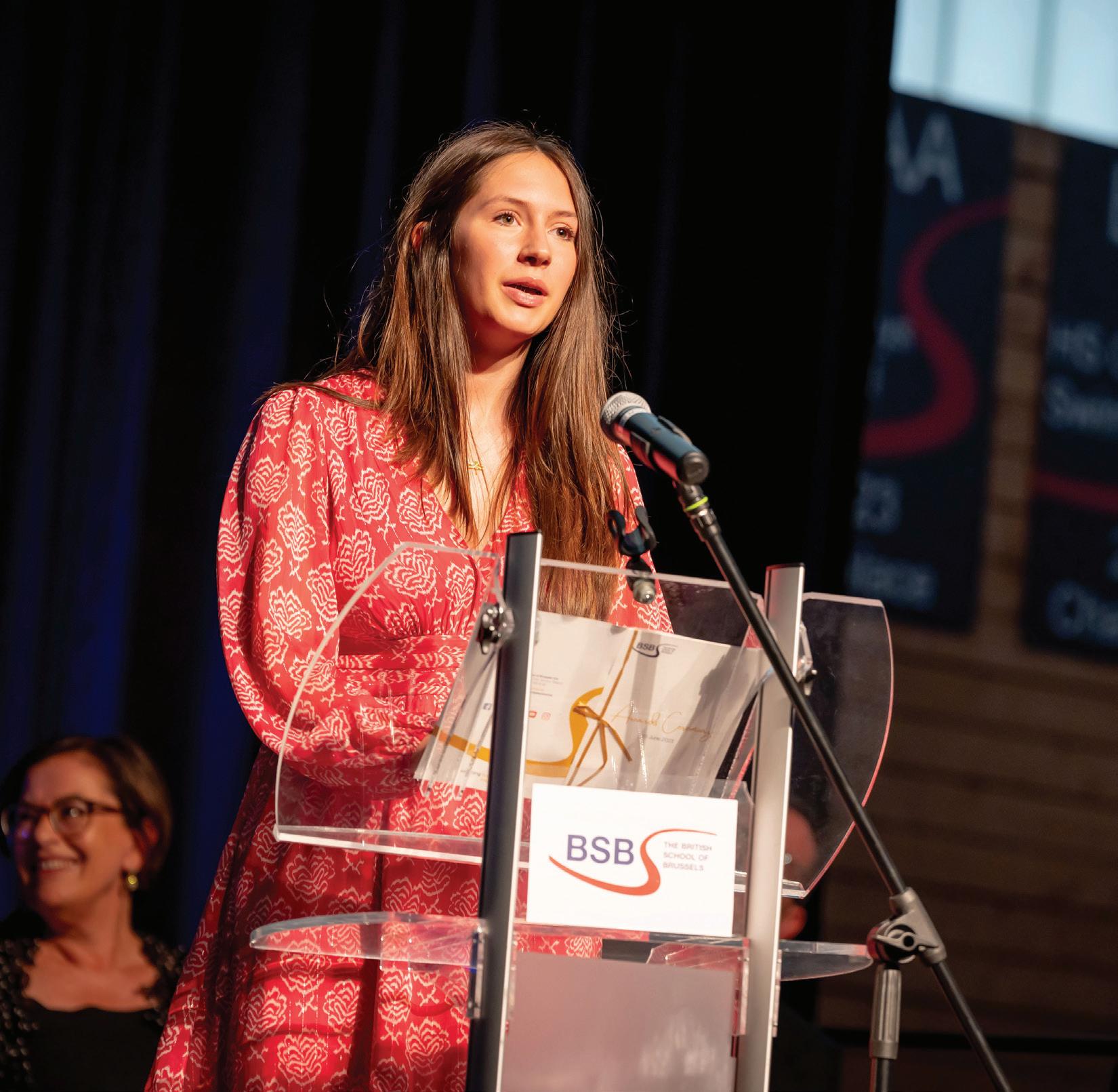
The Post-16 Options Process is a collaborative and student-centred process aimed at supporting students in selecting their best fit Pathway.
Students and parents are supported in this process by a team of BSB staff members. The following principles guide our work:
• Student voice is a vital part of this process
• Clear, open, honest and frequent communication amongst all stakeholders is essential
• The use of multiple pieces of evidence/data points is key to making an informed decision
• All decisions should be made collaboratively and with the student’s interests in mind
• All students should be able to find “success” on an appropriately chosen Pathway at BSB.
We have an experienced and passionate team to support students and parents throughout this process. Each team member offers expertise and guidance in varied areas and collaborates to provide comprehensive support. This team guides students through a thoughtful and future-oriented process of meaningful reflection, university/career research, and collaborative discussion to help students identify their best-fit Pathway.
• Head of Post-16 and IB Co-ordinator – James Rollinson
• Head of Higher Education – Mark Andrews
• Higher Education Advisors – Rosana Morison and Fiona Macaulay
• BSB Futures Coordinator – Jo Craig
• Head of Year 11 – Debbie Scarlett
• Deputy Head of Curriculum – David Hindley
To further support students in choosing the pathway for them, we have articulated appropriate direct entry criteria for each Pathway which align with the rigor, depth, breadth and pace of learning necessary to find success in each programme of study. These will be detailed over the coming pages.
Timeline in Year 11
October
November
Early DecemberEarly January
Mid January
Summer Term
Late August
Late August/Early September
Updated September 2024
Other information
Intro to Post-16 Pathway Options Process
Exploration of two supporting tools: Unifrog and Morrisby assessment
Post-16 Pathway Options evening
Post-16 Pathways Exploration
A time for discussions with subject teachers and Post-16 team
Y11 Internal ‘Mock’ Examinations
Internal ‘Mock’ Exam results released
Post-16 Pathway Options submitted
GCSE Exams
GSCE Results released
Pathway/Course Changes for individual students, as needed.
Advanced Levels (A Levels) is a rigorous, internationally recognised programme from the UK. A typical A Level programme consists of three A Level courses, allowing students to pursue courses which best align with their post-BSB plans, passions, interests, and strengths. In rare cases, students may wish to add a fourth subject in either Further Mathematics or a modern language. Additionally, A Level students will complete the Extended Project Qualification (EPQ), an independent piece of research done on a subject of the student’s choice. They will also engage in our CAS Programme to promote creativity, physical activity, and community service.
The standard university requirement in the United Kingdom and Europe is three A Levels. This can be a combination of A Levels and BTEC (see next page). Occasionally, students of high mathematical or linguistic ability may take a fourth A Level in either Further Maths or a modern language, but this is exceptional. New A Level students who have not completed GCSEs will initially be placed in classes for Maths and English (I)GCSEs. It is possible for students to discontinue these classes but only following discussions with the Head of Post-16.
Sciences and Technology
Languages
Human, Social and Political Sciences
Mathematics
The Arts
Biology, Chemistry, Physics, Computer Science, Design and Technology, Textiles
English Literature, French, German, Spanish, Media Studies
History, Economics, Sociology, Geography, Business Studies, Government and Politics
Maths, Further Maths
Music, Music Technology, Art and Design, Drama
Please note that not all combinations of subjects are possible. Please refer to the current option blocks.
To support students in identifying whether A Levels is a suitable pathway for them, we require students to have earned a combination of at least three 6s and two 5s on their (l)GCSEs, preferably in courses aligned with their chosen A Level courses. This ensures students are capable of the depth of study required in their chosen A Level courses.
All new students will sit a diagnostic assessment, which will be sent to their previous school to complete. This is NOT an entry level test into BSB but rather a means to ascertaining the suitability of subjects and levels in advance of their arrival in September
For some courses, as outlined below, there are some additional entry requirements: Subject Area
All others being continued from (I)GCSE
Grade 6-9
* As the Science curricula are very mathematical, a grade 6 is desired in Maths in order to study Biology and Chemistry, and a grade 7 is desired in Maths in order to study Physics.
** Entry for students who miss the direct entry requirements by one or two grades can be considered on a case by case basis with additional conditions required.
The International Business and Technical Education Council Qualification Level 3 is a two-year programme of study in vocational courses and is designed to prepare students for further study or career preparation in a field aligned with our BTEC course offerings. This pathway is a choice for everyone who prefers to “learn by doing” and continuous assessment rather than traditional examinations.
The International BTEC Pathway allows students to pursue either Subsidiary Diplomas in all three BTEC courses or the International BTEC “Extended Diploma” by choosing to pursue a Diploma in BTEC Business and a Subsidiary Diploma in either Hospitality or Sport. The BTEC qualifications are largely accepted at UK universities, and the BTEC “Extended Diploma” is also accepted at a select number of Dutch universities of Applied Sciences. More detail can be found in the Higher Education section at the end of this booklet.
• International BTEC Extended Diploma = Diploma in BTEC Business + Subsidiary Diploma in either Hospitality or Sport. Diploma in BTEC Business is a “double” class, equivalent to TWO A Levels.
• International Subsidiary Diploma in either Business, Hospitality, or Sport is a “single” class, equivalent to ONE A Level.
• Additionally, BTEC students will complete the Extended Project Qualification (EPQ), an independent piece of research done on a subject of the student’s choice and will also engage in our CAS Programme to promote creativity, physical activity, and community service.
Business
Hospitality
Sport
Subsidiary Diploma Diploma
Subsidiary Diploma
Subsidiary Diploma
Equivalent to one A Level Equivalent to two A Levels
Equivalent to one A Level
Equivalent to one A Level
Please note that not all combinations of subjects are possible. Please refer to the current option blocks.
New students arriving from other schools will be interviewed and will be expected to have reports indicating that they have a level of education equivalent to the grades indicated below. To support students in identifying whether BTEC is the right pathway for them, we recommend students to have a minimum of five (l)GCSEs at grade 4 and above. For students who have not done (l)GCSEs, equivalent results in their courses of study across Years 10-11 is recommended. However, due to the courses being continually assessed, there may be greater flexibility regarding direct entry criteria. Note: For students only intending to stay at BSB for one year, BTEC certificates may be possible. Talk to the Post-16 team if this is something you are considering. All new students will also take a diagnostic assessment before arrival. This is NOT an entry test.
Some students may be interested in doing a combination of two A Levels and one BTEC Subsidiary Diploma to best meet their needs and interests. This pathway is accepted at a wide range of universities in the UK as well as Applied Science universities in the Netherlands. A minimum of two A Levels are required for the latter. Additionally, students on the A Level / BTEC Combination Pathway will also engage in CAS to promote creativity, physical activity, and community service, and will complete the Extended Project Qualification (EPQ), an independent piece of research on a subject of the student’s choice. To support them in identifying whether the combination A Levels and BTEC Pathway is the right pathway for them, we require students to have a minimum of a grade 6 in their chosen (or closely related) courses for A Levels. For students who have not done (l)GCSEs, equivalent results in their courses of study across Years 10-11 is required. BTEC Level 3 subjects can be combined with A Levels although not all combinations can be catered for catered for (see blocks).
* Please note; although the BTEC is accepted at some higher education institutions outside the UK, the individual BTEC qualifications tend to be only accepted at UK universities.
The International Baccalaureate (IB) Diploma Programme (DP) is a rigorous, internationally recognised two-year programme of study. The IB DP supports students who may wish to explore a broad range of subjects in Years 12-13. At its core, The IB DP promotes language and literacy, multi-lingualism, interdisciplinary learning, service, and international-mindedness. Students who choose the IB Diploma Programme must select six subjects from various IB groups. Required courses include Mathematics, two Languages, a Social Science, and a Science. For their sixth subject, students can choose a course from The Arts group or take a second Science or Social Science course. Additionally, IB DP students will engage in the IB’s “Core” Components of Theory of Knowledge (ToK), the Extended Essay (EE) and the Creativity, Activity, and Service (CAS) Programme. Three subjects are studied at Higher Level (HL) and three at Standard Level (SL). In addition, students take the core components as shown in the table below:
Theory of Knowledge (TOK)
Extended Essay
Creativity, Activity, Service (CAS)
Area
Studies in Language and Literature
Language Acquisition
Individuals and Societies
Reflection on the nature of knowledge and on how we know what we claim to know
Exhibition and Essay
Independent, self-directed piece of research 4,000-word essay
Students are involved in a range of activities alongside their academic studies
Not formally assessed, but students reflect on their activities as part of the IB programme and must document this for the award of the diploma.
Subject
English, French, Dutch, Self-study (SL only)
French, German, Spanish, Dutch
History, Economics, Psychology, Geography, Business Sciences Physics, Biology, Chemistry, Environmental Systems and Societies (SL only) and Computer Science Mathematics Mathematics Analysis and Mathematics Applications
The Arts or an elective subject Music, Visual Arts, Film, Theatre Arts or one of the subjects above
Please note that not all combinations of subjects are possible. Please refer to the current option blocks.
As the IB Diploma Programme is our most comprehensive programme of study, we have identified a path for Direct Entry** into the IB Diploma Programme. For Direct Entry onto the IB Diploma Programme, students require a minimum of three grade 6’s in Maths, English and Science along with a further two grade 5’s in their GCSE results. For students who have not taken (I)GCSEs, equivalent results in their courses of study across Years 10-11 is required for Direct Entry onto the IB Diploma Programme (please refer to section on entry requirements on page 5). In general, students require a minimum of five (I)GCSEs at grade 5 and above, including three at grade 6. There are some additional entry requirements:
All new students will sit diagnostic assessment, which will be sent to their previous school to complete. This NOT an entry level test into BSB but to ascertain the suitability of subjects and levels in advance of their arrival in September
HL Biology, Chemistry and Physics*
7 7 - 9 9 (Double Award)
8/9
7-9 Computer
All other HL subjects
7-9
6-9
*As the Science curricula are very mathematical, a grade 6 is desired in Maths in order to study Biology HL and Chemistry HL, and a grade 7 is desired in Maths in order to study Physics HL.
**Entry for students who miss the entry requirements by a grade or two will be considered on a case-by-case basis with additional conditions required. Consequently, while the IB pathway is unlikely to be the best fit for students who are entered for Foundation tier in Mathematics, the pathway can be considered.
For those students who are intending to pursue Higher Education following their time at BSB, the following information will be of use in the options process
In general, very few university courses have GCSEs or Level 2 BTEC as part of the admissions requirements. New students to Year 11 should note that, if you go on to study A Levels, then it may not be possible to apply to some Dutch and Irish universities, as some require at least six different subjects at GCSE or A Level.
An International Baccalaureate (IB) Diploma is recognised globally as an entrance qualification
This is sometimes dependent on the subjects chosen for the Diploma. In some cases, specific grades are required.
On the course Economics at Tilburg, the Diploma must include Standard Level AA Maths (or higher).
Economics at LSE stipulates 38 points in total, with grades of 7, 6 & 6 at Higher Level (including a 7 in HL Maths).
Students considering entry in German or Swiss universities in particular should check carefully which IB subjects and levels are required.
A Levels are also globally recognised as a university entrance qualification
Most universities require three A Levels; some just two. The subjects/grades of the A Levels can have a bearing on whether or not an offer is made.
4-year
• Most Dutch universities require six different subjects in total. This usually means A Levels & GCSEs (grade C/4 or above).
• Ireland expects A Level students to have also completed GCSE exams.
• A Levels in Spain require ‘homologation’ which is an involved bureaucratic process of equivalence.
Entry requirements for German, Swiss and Swedish universities must be checked carefully, including whether A Level results issued in August can be processed by the university in time.
The BTEC Extended Diploma is less widely accepted around the world
Most universities in the UK, including some highly selective ones, will treat it as the equivalent of three A Levels or the IB Diploma.
Universities of Applied Science in Belgium and the Netherlands accept the BTEC Extended Diploma, but research universities do not.
Some other European universities accept BTEC Extended Diploma as equivalent to IB/A Level. For example IE University in Madrid accepts the BTEC Extended Diploma.
BTEC is not accepted in Germany.
As with A Levels, universities can ask for specific grades and/or specific subjects.
The BTEC/A Level combination works well for UK universities
Numerous students in Britain have chosen this combination.
Many UK universities total the ‘UCAS Points’ from different qualifications, instead of simply asking for A Level grades/IB score. For example, Merit or a C grade = 32 Points; Distinction or A grade = 48. (EPQ carries half the points of A Levels).
Criminology at Northumbria requires 120 UCAS Points. Some non-UK universities also accept a split qualification.
Business at KU Leuven or Odisee in Brussels.
If there are two A Levels in the combination, this works fine with universities needing two A Levels (at grade E or above). An example of this is universities of applied sciences in the Netherlands. In these cases, most will also stipulate 4 GCSEs in different subjects at grade C/4 or above.
BTECs other than Extended Diploma need to be checked on a case-by-case basis.
Any of the four pathways above give students access to a large number of universities. However, for those students with specific university destinations or courses in mind, specific research is key. Different universities in each country will have differing requirements for their courses. Fortunately, universities generally make their entry requirements easy to find.
What resources do BSB students have access to as support to research and reflection?
Students at BSB benefit from excellent support with higher education decision-making. BSB uses tools such as the platform Unifrog to help students navigate the world of higher education. Students are also given the opportunity to generate a Morrisby Profile, to help them discover the options that will work well for them. The Higher Education and BSB Futures team meet students individually to help guide them in decisions about the future. In addition, a range of round-table discussions, talks and university fairs are routinely organised for students, exposing them to the myriad opportunities available and helping them make informed decisions.
What is the class size? The maximum class size is usually 14 students although this can occasionally be higher in exceptional circumstances.
Do you offer the bilingual IB Diploma?
Can I join either of these year groups at any time?
What happens if my child fails Year 12?
What support is offered for Post-18?
What do I need to bring with me?
My child needs English as an additional language (EAL) support. What is provided?
My child has additional educational needs (AEN). How does the school help?
For students with the appropriate linguistic abilities, it is possible to take both language options as language A (Language A means language taught at a level appropriate to a native speaker). A bilingual IB Diploma does not mean that all subjects are taught in two languages. The bilingual diploma can also be awarded to any student who takes one non-English language as Language A.
No, the IB, A Levels and BTEC are challenging two-year courses. All students need to start in September of Year 12.
The vast majority of our students work hard and continue into Year 13. On a case-by-case basis, we may advise students to repeat Year 12, on a different pathway, but this is rare.
Students have access to the Head of Higher Education (HE) and the BSB Futures team, who provide advice on university courses and applications as well as other options beyond Year 13.
A laptop is needed for all Post-16 students. In addition, a graphical calculator is required for Maths. The model is specified at the beginning of the course.
Due to the challenging nature of the courses, students require an appropriate level of English to access the curriculum. For nonnative English speakers, this is assessed prior to joining BSB.
AEN students are assessed by the Head of Learning Support prior to joining BSB. If BSB is able to accommodate the student’s needs, the application can be taken further and advice is given on appropriate courses.

‘‘ ‘‘ ‘‘ ‘‘ ‘‘ ’’ ’’ ’’ ’’ ’’
The BSB has excellent, kind and motivating teachers who made great efforts to integrate our son who came from a different school system. The enrichment activities are excellent, and the facilities are outstanding.
Aandahl family
BSB values each child as an individual. Students gain an open, internationally aware perspective on life.
Wallace family
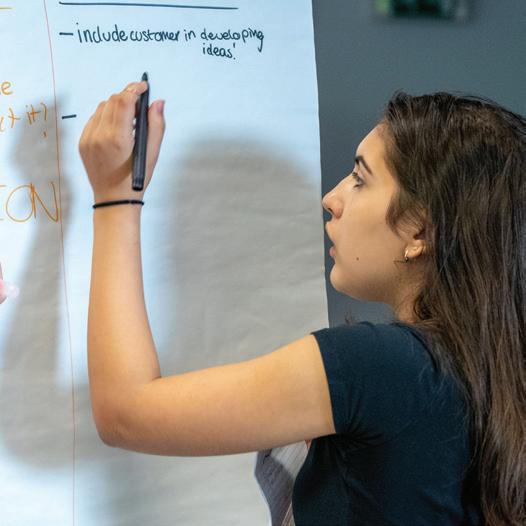
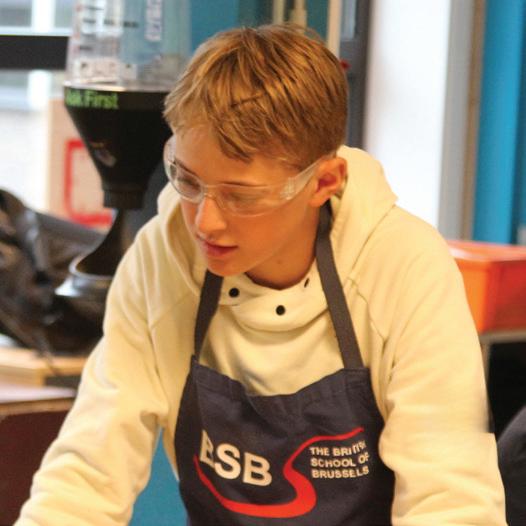
A lovely and caring environment, both our children immediately felt welcome and included. Great learning support as soon as the need was identified.
Pollmeier family
The teachers always encouraged and respected my child’s efforts toward learning. He enjoyed his time at BSB and is really proud of being a student of BSB.
Inoue family
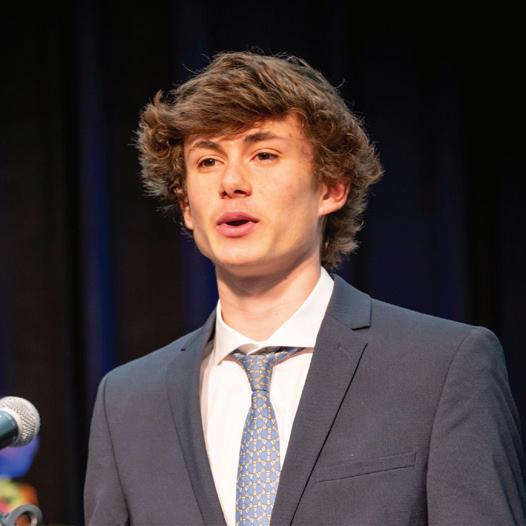
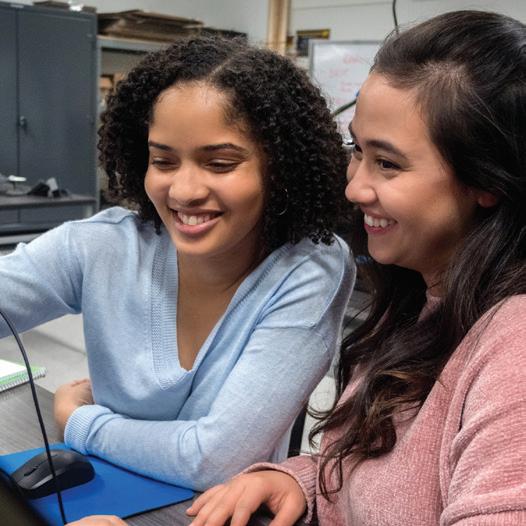
Excellent teaching in a wonderful community atmosphere, fantastic extra-curricular activities, good communication between the school, children and parents. Meenan family
The British School of Brussels vzw Pater Dupierreuxlaan 1, 3080 Tervuren, Belgium
Tel: +32 (0)2 766 04 30 – Fax: +32 (0)2 767 80 70 www.britishschool.be
Email: admissions@britishschool.be